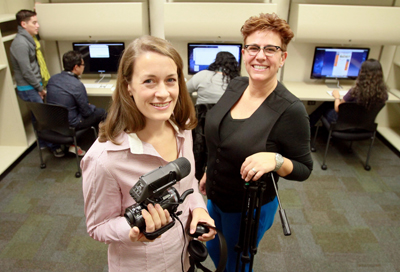The Ethnography of Languages, Literacies, and Learning (EL3) Lab in Room 310 and 310A of the Education Building opened this summer to enhance the scope and opportunities of ethnographic research that can be done by students and faculty to benefit education and beyond.
Katherine Mortimer, Ph.D., assistant professor of bilingual education and lab co-director, described ethnography as an anthropology-based research approach that includes long-term participant observation in a community by the researcher. What her predecessors did with pencils and index cards is now done with audio, video and digital recordings to understand biliteracy practices among students; teachers and students; parents and teachers; and others.
“Those perspectives of community stakeholders need to be a part of the conversation about solutions to (academic) inequalities that happen across language and linguistic and cultural groups,” Mortimer said. “The video recordings allow a much finer-grained analysis nowadays than had been possible in the past.”
Researchers will use the recordings as well as more traditional data such as interviews, written documents and environmental photos to learn why a community thinks what it thinks. The results will help parents, educators and policymakers determine the best ways English language learners, bilingual students and monolingual English speakers can do better in school.
The lab includes a lending library where students and faculty can borrow state-of-the-art video equipment to record classroom interaction, a data analysis center where students can transcribe the data and examine it using qualitative data analysis software, and space where interested parties can gather for discussions and presentations.
The EL3 has been in steady use by doctoral students checking out the equipment, as a classroom for undergraduates and graduate students, and as home to the EL3 Research Conversations Series, a biweekly forum where faculty and doctoral students can discuss their literacy and biliteracy research.
UTEP recently awarded internal funding to five lab faculty advisers to oversee doctoral student research assistants who will use the lab’s equipment and space to study student-teaching experiences and document practices in exemplary dual-language classrooms to improve EC-6 (early childhood to 6th grade) teacher preparation.
“This (lab) provides a space that I think accelerates innovation for individual ethnographers because of the chance to be together and exchange ideas,” said Mortimer, who added that representatives from universities in Mexico and the United States already have expressed interest in future collaborations. “It creates a space for teams to do bigger and deeper ethnographies.”
While the lab’s initial users will come from UTEP’s College of Education, its leaders believe it will eventually draw scholars from the fields of anthropology, business, communication, history, linguistics, rhetoric and sociology.
Char Ullman, Ph.D., associate professor of teacher education and the lab’s co-director, referred to ethnography as “the history of the present” that promotes greater understanding of cultures on their own terms.
Before the existence of this lab, UTEP faculty and students scrambled to borrow equipment to record data and they often repurposed office utility software for data analysis. Today’s technology provides far more powerful ways to analyze data, which allows researchers to do more and conduct more in-depth analysis, said Ullman, an educational anthropologist.
“Because UTEP has strong departments across campus in which scholars employ ethnographic methods, it is imperative that we have the equipment and space available to do this work,” Ullman said.
Among the students who have a “before and after” perspective is UTEP doctoral student Emiliano Villarreal, who expects to earn his doctoral degree in Teaching, Learning and Culture in 2015. He said 21st century ethnographic research was cost-prohibitive to many students.
“Now we can go all out,” said Villareal, a Juárez native who started his degree plan in 2011. The lab’s doctoral student coordinator is researching the effect of narco-culture on academics. “We don’t have to hold back anymore. With the lab’s professional-grade equipment, the sky is the limit.”
The lab was initiated by Mortimer and supported by Department of Teacher Education faculty because they understood its value to them and the program’s 60 doctoral students, said Maria T. de la Piedra, Ph.D., associate professor and department chair. She sees the potential for growth, grants and additional national visibility.
Nancy Hornberger, Ph.D., agrees. The professor of education and chair of educational linguistics at the University of Pennsylvania’s Graduate School of Education has researched language and education in culturally and linguistically diverse settings for almost 40 years. She said UTEP’s new lab will enhance the University’s visibility through research on an educational issue of worldwide concern.
“UTEP and the Paso del Norte region, with its long tradition of border-crossing and multilingualism, offer an unusually rich site for exploring and understanding biliteracy,” Hornberger said. “Significantly, the lab’s emphasis on ethnographic and qualitative study promises to yield deep and place-based perspectives toward creating more equitable educational experiences for all learners in UTEP’s unique border context.”
